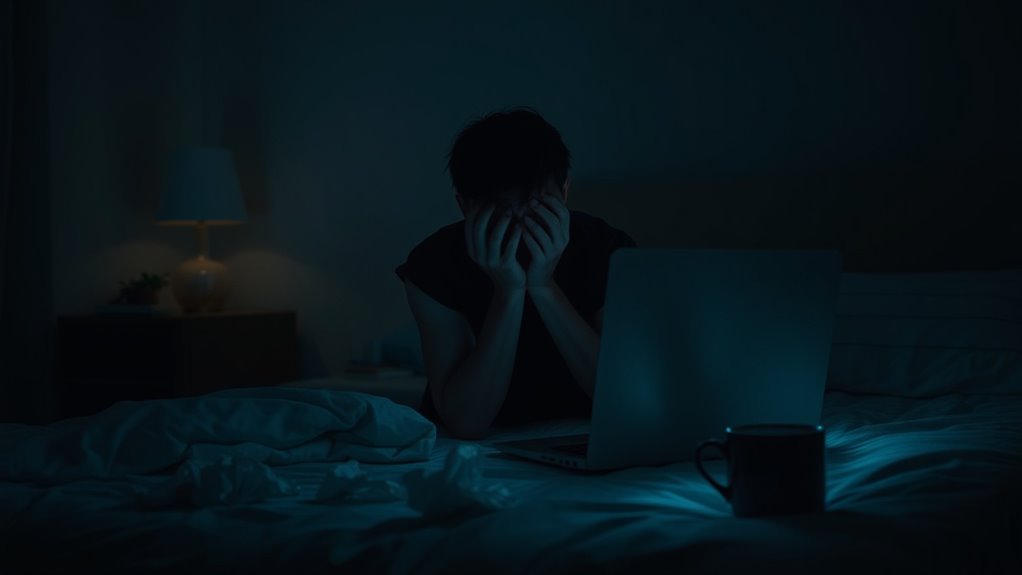Discovering your partner’s porn use can feel like betrayal and shake your trust. It’s normal to experience shock, anger, or sadness, and it’s important to acknowledge these emotions. Share your feelings with trusted friends, set clear boundaries, and seek honest communication from your partner. Addressing underlying issues like addiction can help rebuild trust over time. If you want to understand how to process these feelings and find support, there’s more to explore.
Key Takeaways
- Acknowledge and validate your feelings of betrayal and hurt as natural reactions to your partner’s secret porn use.
- Communicate openly with your partner about your emotions and boundaries to rebuild trust and understanding.
- Seek support from trusted friends, family, or a counselor to process emotions and gain perspective.
- Address underlying issues like porn addiction or insecurity to facilitate healing and prevent recurrence.
- Prioritize self-care and establish boundaries to protect your emotional well-being during the recovery process.

Many relationships are shattered when one partner’s secret addiction to pornography is uncovered. The moment you discover your partner’s secret, it can feel like a personal betrayal, even if they didn’t intend to hurt you. You might experience shock, anger, sadness, or confusion all at once. It’s natural to question the foundation of your relationship and wonder if trust can ever be rebuilt. Pornography, when kept secret or used excessively, can create a sense of emotional and physical distance that feels just as damaging as infidelity. You may start to doubt your partner’s feelings for you or worry about whether your relationship was built on honesty.
It’s important to recognize that your feelings are valid. You’re not overreacting or being unreasonable. Many people experience intense emotions when confronting this type of betrayal. It’s a loss of trust, and that loss can shake your self-esteem and sense of security. You might replay the moment you found out, searching for answers or trying to understand why it happened. Your mind might race with questions: Was it about loneliness? Insecurity? A need for validation? Or simply a compulsive habit your partner couldn’t control? Whatever the reason, remember that your feelings deserve acknowledgment and respect.
Instead of suppressing your emotions, give yourself permission to feel them fully. You might feel anger, which is a natural response to betrayal, or sadness, which reflects your sense of loss. Reach out to trusted friends, family, or a counselor who can listen without judgment. Sharing your feelings can help you process what’s happened and gain perspective. It’s also crucial to set boundaries for yourself. Decide what you need from your partner to feel safe and respected moving forward. This might include honesty, transparency, or professional help for their addiction. Cookies can also play a role in providing transparency and ensuring your privacy preferences are respected as you navigate this difficult time. Communicating openly and clearly about your needs can help rebuild trust more effectively through consistent honesty. Recognizing the underlying issues, such as porn addiction, can be a vital step towards healing and moving forward. Additionally, understanding the role of holistic SEO strategies can help you seek out resources and support networks effectively.
Frequently Asked Questions
How Can I Tell if My Partner’S Porn Use Is Addictive?
You might wonder if your partner’s porn use is addictive when it starts affecting daily life, responsibilities, or your relationship. Notice if they prioritize it over intimacy, become secretive, or experience withdrawal symptoms when stopping. If their use feels uncontrollable or causes distress, it could signal addiction. Trust your feelings and observe patterns—professional help can offer clarity and support in addressing these concerns effectively.
What Are Healthy Boundaries Regarding Porn in Relationships?
You set healthy boundaries in your relationship by openly discussing your comfort levels with porn use. Decide together what’s acceptable, like limiting frequency or types of content, and respect each other’s feelings. Keep communication honest and non-judgmental to build trust. Remember, boundaries should protect your emotional safety, so revisit and adjust them as needed. Prioritizing mutual understanding helps maintain a respectful, healthy connection.
How Do I Rebuild Trust After Discovering My Partner’S Porn Habits?
Imagine rebuilding a damaged bridge—you need patience, effort, and clear steps. To rebuild trust after discovering your partner’s porn habits, start with honest conversations, expressing how it affected you. Set healthy boundaries together, and seek reassurance. Remember, trust takes time; be patient with yourself and your partner’s efforts. Counseling can also aid this process. Over time, you can restore a strong, secure connection.
Can Couples Therapy Help Address Issues Related to Porn Betrayal?
Couples therapy can be really helpful when you’re dealing with issues related to porn betrayal. It provides a safe space for you both to express feelings, understand each other’s perspectives, and work through trust issues. A trained therapist guides you in developing healthier communication and boundaries. With patience and effort, therapy can facilitate healing, rebuild intimacy, and help you navigate complex emotions around your partner’s porn use.
What Signs Indicate My Partner’S Porn Use Is a Form of Emotional Betrayal?
Imagine your trust as a fragile glass, shimmering with honesty. When your partner’s secretive porn habits feel like emotional betrayal, it’s like cracks forming in that glass. You might notice signs like secrecy, hiding screens, or dismissing your feelings. These signals suggest that their actions aren’t just about images but about emotional distance, making you feel betrayed and unsure if their love is truly present or just an illusion.
Conclusion
Remember, maneuvering feelings of betrayal is like steering through a storm—you’ll find calmer waters if you stay honest and open. Trust takes time to rebuild, and it’s okay to feel hurt or confused along the way. Focus on honest communication and mutual understanding, like two anchors holding steady in rough seas. With patience and compassion, you can transform this pain into a stronger, more honest connection. Your journey toward healing begins with small, courageous steps.









